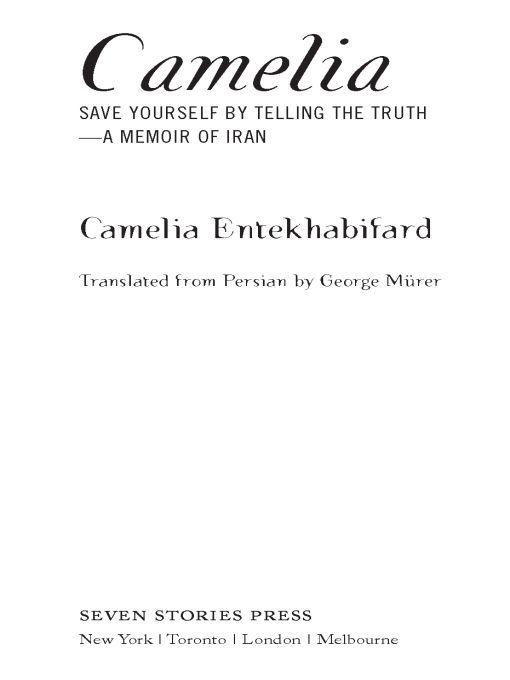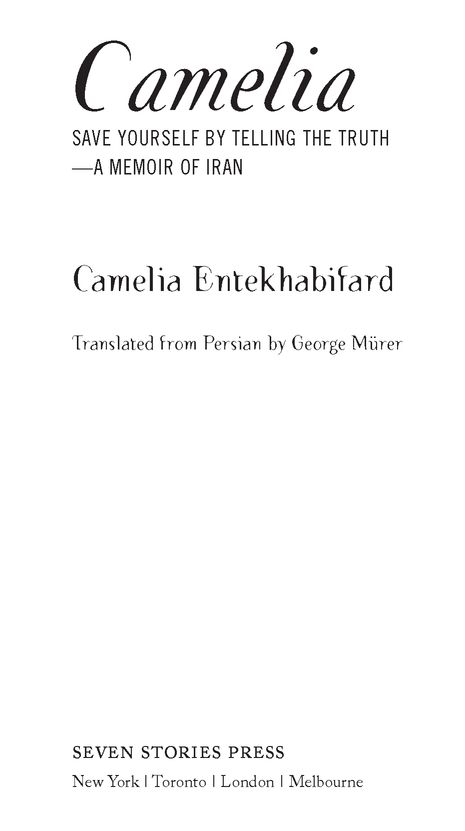Camelia
Authors: Camelia Entekhabifard

Table of Contents
Â
Â
Â
Â
Â
Â
Â
Â
Â
Â
Â
Â
Â
Â
“In this psychologically complex and morally controversial autobiography, Camelia takes the reader on a surreal tour of post-revolutionary Iran, where under harsh medieval laws (much harsher for women) the âchildren of the revolution' become anti-revolutionary, deceit and trickery become the rule of the game, and the demoralized youth do almost anything for a breath of fresh airâfor freedom.”
âFarnoosh Moshiri, author of
Against Gravity
Against Gravity
Â
“Entekhabifard has written an affecting, emotionally rich memoir that is a must-read for anyone concerned with the current Iranian predicament, women's rights, or the plight of journalists in authoritarian states.”
âAfshin Molavi, author of
The Soul of Iran: A Nation's Journey to Freedom
The Soul of Iran: A Nation's Journey to Freedom
Â
“As important as its summary of the facts is Entekhabifard's rendering of the horror of life forcibly stripped of all personality in graceful and precise prose.”
â
Bust Magazine
Bust Magazine
Â
“Books like this one remind us that literature remains one of our most potentâand poignantâmeans of expression and creating empathy through shared experience.”
â
Kirkus Reviews
, Top Picks for Reading Groups
Kirkus Reviews
, Top Picks for Reading Groups
Â
“Iranian journalist Entekhabifard's enlightening memoir traces her childhood in Tehran . . . [She] brings unique courage and insight to her practice of journalism, for which she and her family have paid a dear price.”
â
Booklist
Booklist
Â
“Camelia's courage is a symbol of humanity's hope under the worst kind of oppression. A heart-stopping story that you will not be able to put down . . . this book will take your breath away.”
âAhmed Rashid, author of
Taliban: Militant Islam, Oil, and Fundamentalism in Central Asia
Taliban: Militant Islam, Oil, and Fundamentalism in Central Asia

To the memory of my father. To my brave and unique mother. To all those who have stayed in Iran.
TRANSLATOR'S NOTE
Because this memoir is not a scholarly work, a distinction has not been made in the transliteration of the long a/
alif
and the short a/
fatha
sounds, with the exception of the word “Salaam.” In constructions involving the Arabic definite article al-, the l has been assimilated to sun letters to reflect common pronunciation. Exceptions to the rule have been made for names of well-known individuals, which are spelled as they commonly appear in print media.
alif
and the short a/
fatha
sounds, with the exception of the word “Salaam.” In constructions involving the Arabic definite article al-, the l has been assimilated to sun letters to reflect common pronunciation. Exceptions to the rule have been made for names of well-known individuals, which are spelled as they commonly appear in print media.
chapter one
When the Shah Left, We Stayed
JANUARY 16, 1979My mother sat dressed in black on the purple sofa in our salon, tears streaming down her face. Every so often, I'd peek out at her from my bedroom. Her ears were stuffed firmly with cotton, and at her side sat Mino Khanum, our close friend and neighbor whose hair was always dyed burgundy. She was also visibly upset.
My mother had covered her body in black to mourn my grandfather. I knew this because, two months before, we had all gone to Behesht-e Zahra, the largest cemetery in Tehran, and my parents had told my cousin Elham; my sister, Katayun; and me to wait in the car. I understood my grandfather had died. But of my mother's sobbing, I understood nothing.
The transistor radio sat playing at my mother's side, and from time to time she would take the cotton out of her ears to hear the voice of the radio announcer better. She wanted to hear the news, but at the same time, she lacked the strength to keep listening. With each news flash, her heavy sobbing intensified, and she jammed the cotton even harder back into her ears. It was Tuesday morning, and it was my birthday. At the age of six, nothing was more important to me than celebrating my birthday. I knew a party was out of the question; we were in mourning. But my mother had promised we would go downtown to pick out my present. The radio announcer started yelling at the top of his voice, “The Shah is gone! The Shah is gone!” Both my mother and Mino Khanum fainted.

It had gotten dark, and with me clinging to my mother's black overcoat, we headed south on the downward incline of Khiaban-e Vali-ye Ahd. My mother was impatient, and she had been crying so much that her eyes and nose were red. I had not let her forget about buying that present. It was out of sheer helplessness that she had taken my hand in hers and set off for Mufid's, a store that was piled to the ceiling with Barbie dolls and colorful toys. Agha-ye Mufid, the owner, was always waiting for my sister, Kati, and me.
Our street, Kucheh-ye Omid, was enveloped in silence and total darkness. The avenue was quiet, too, but only a few streets before the main thoroughfare we were suddenly engulfed in a flood of cars with their horns blaring and headlights flashing. The street was filled with the sound of their joy, and my mother cursed them under her breath. Overwhelmed and bewildered, I clung even more tightly to her. She turned to me and said, “I told you it would be better not to go out tonight . . .” Her voice was lost in the din of car horns and people shouting. Everyone was congratulating one another and handing out sweets. They also congratulated us, but my mother kept her head down as we barreled straight ahead. After months of fighting between forces loyal to the Shah and the revolutionary masses, the Shah and his queen had left Iran for Cairo, and the people were pouring out onto the streets to celebrate.
In the midst of that frightful traffic and noise, a hand holding a giant stuffed cloth dog emerged from the window of a Peykan and danced, wiggling at us and no one and everyone at once. “The Shah is gone! The Shah is gone!” The man who danced the toy in front of us had whiskers down to his waist. His voice warbled, “
Tuleh sag-e Alashi, Bakhtiar-ra ja gozashti!
” (You little Alashi dog, you left Bakhtiar behind!) He called the dog Alashi because the Shah's father, Reza Shah, was from the village of Alash in the
north of Iran, and by Bakhtiar he meant the prime minister, Doctor Shahpur Bakhtiar. Bakhtiar was negotiating with various revolutionary groups, attempting to keep the country under control in the Shah's absence. He had even proposed going to Paris to negotiate with Ayatollah Khomeini. But when the people cried, “
Tuleh sag-e Alashi, Bakhtiar-ra ja gozashti!
” they also meant that they had driven the Shah out of their houseâwhich is to say Iranâlike an unclean dog.
Tuleh sag-e Alashi, Bakhtiar-ra ja gozashti!
” (You little Alashi dog, you left Bakhtiar behind!) He called the dog Alashi because the Shah's father, Reza Shah, was from the village of Alash in the
north of Iran, and by Bakhtiar he meant the prime minister, Doctor Shahpur Bakhtiar. Bakhtiar was negotiating with various revolutionary groups, attempting to keep the country under control in the Shah's absence. He had even proposed going to Paris to negotiate with Ayatollah Khomeini. But when the people cried, “
Tuleh sag-e Alashi, Bakhtiar-ra ja gozashti!
” they also meant that they had driven the Shah out of their houseâwhich is to say Iranâlike an unclean dog.
At home in our house, we had neither listened to the personal communiqués from Ayatollah Khomeini who was arriving from Paris, nor did we join the throngs of revolutionaries burning tires in the streets. When revolutionaries tossed their manifestos into our courtyard at night, my father would throw them back out onto the street. We didn't want to know where they planned to gather, and we weren't interested in the mullahs or that surly old man with the crooked black eyebrows either. We liked to think that we could sit still and ignore all the commotion, and that if we did, the crisis would subside and the country would return to its regular old self.
When we had been in England for the summer holidays, my mother had gotten upset when she read the words “Death to the Shah” written in Persian on the wall in the London metro. In Hyde Park we'd seen young Iranian students standing on chairs, shouting slogans against the Shah amid a gathering crowd. On more than one occasion my mother yelled back at them, as she held Kati and me at her sides. “Come down from there you ungrateful brats! That poor Shah gave you money so you could go to school and now all that money has made you into wolves, and you stand up there howling away!” In London my mother hadn't been afraid to tell them she was a supporter of the Shah. She was proud of the Shah's pledge to safeguard the freedom and progress of the women of Iran, and of all the opportunities he had opened up for them. But today, in the middle of Khiaban-e Kennedy, besieged by the Shah's opponents,
my mother just clamped her lips together in anger.
my mother just clamped her lips together in anger.
We finally reached the toy store, and it was closed. Every shop was closed. Afraid of looting, the shopkeepers had pulled down the shuttered gates at noon that day and hurried home. When I saw that the sign proclaiming “Mufid” in neon was turned off, tears started running down my cheeks. It was of no importance to me that the Shah had gone or that someone else would come to take his place or that the days ahead were bound to be completely unpredictable. I just wanted my present. My mother promised, “Tomorrow . . . tomorrow. . . .”

Other books
Lights to My Siren by Lani Lynn Vale
After We Collided (The After Series) by Todd, Anna
Merlin's Wood (Mythago Wood) by Robert Holdstock
Tyed to You by Jordyn McKenzie
Beauty's Kiss by Jane Porter
Texas Showdown by Don Pendleton, Dick Stivers
[Canadian West 05] - Beyond the Gathering Storm by Janette Oke
Me and Orson Welles by Robert Kaplow
Brute Force by Marc Cameron